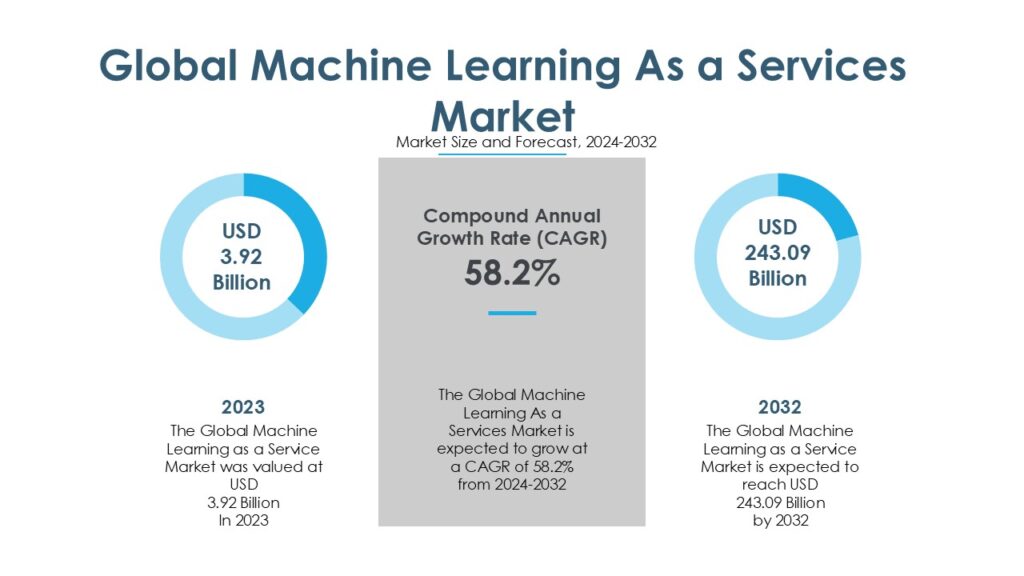The Market for Machine Learning as a Service (MLaaS) depicts the emerging and actively growing market area associated with the development of artificial intelligence. MLaaS offers the necessary machine learning architecture and tools through cloud service providers that will save resources and learnings on hardware and professional services. The scalability of MLaaS allows businesses in various sectors to adopt advanced data analytics for their innovation based on the predictive capabilities and automation within an organization.
The market growth is propelled by big data analytics, the popularity of cloud solutions, and the constantly expanding use of artificial intelligence in healthcare, finance, retail, manufacturing, and other industries. Some prominent vendors offering MLaaS are Amazon Web Services (AWS), Google Cloud, and Microsoft Azure offering all categories A to E of services that pertain to pre-built machine learning models and services, tools for creating, training, and deploying their models. These services are equally applicable to start-ups and Small to Medium-sized Enterprises as well as to big conglomerates.
The Global Machine Learning as a Service Market was valued at US$ 3.92 Billion in 2023 and is anticipated to reach US$ 243.09 Billion by the end of 2032 with a CAGR of 58.2% from 2024 to 2032.

However, the MLaaS market has some issues in its growing key themes like security issues, skills shortage, and high competition in the provider’s market. However, the researchers believe that with technological improvements and growing awareness of the application potentials of MLaaS, the challenges are expected to be addressed making the MLaaS service a key innovation enabler within a data-driven digital economy.
Factors Driving the Growth of the Global Machine Learning As a Service Market in North America:
When it comes to technology adoption, North America takes the highest position – more businesses turn to machine learning and artificial intelligence to be on par with their competitors. The clear market leaders AWS, Google, and Microsoft drive innovation and offer organizations ready-to-use MLaaS solutions, thus supporting market development.
The region has seen increasing adoption of big data analytics and IoT and consequently a massive influx of data. Given the high levels of data generated in organizations, MLaaS provides a way through which firms can process and leverage data, and improve organizational workflows and customer experiences.
About 50% of organizations in North America use cloud computing, which is very relevant in enabling MLaaS. The blending of machine learning capacities with cloud solutions enables enterprises to employ superior models with little capital investment.
Healthcare, retail, and finance industries are among the fastest adaptors to MLaaS with the primary goal of triggering personalized experiences to their clients. For instance, MLaaS includes applications in predictive healthcare, fraud detection in the field of finance, and the recommendation system in e-commerce, causing its continuative popularisation across the wide production and service spheres.
The increase in the number of supporting policies, government funding, and investments in venture capital in AI & ML startups are helping the growth of the MLaaS market in North America. This setup together with a skilled workforce still points to more innovation in machine learning technologies in the region.
Competitive Insights:
Some of the key players of the Global Machine Learning As a Service Market are as follows: Amazon Web Service, Microsoft Azure, Google Cloud, IBM Corporation, Salesforce, Oracle Corporation, Hewlett Packard Enterprises, SAP SE, BigML Inc, Alibaba Cloud, SAS Institute Inc., and other.
The major players in the world of MLaaS are the tech goliaths such as the Amazon web service called AWS, Microsoft Azure, and Google Cloud. The last area where these companies continue to compete is through their scale in the cloud, the sophistication of the tools involving machine learning, and their reach into different markets. The two have a large established customer base and are always innovative making it difficult for new entrants to penetrate the market.
There is usually a high focus on value propositions where companies want their products and services to be differentiated based on levels of customization and scalability. Top competitors offer SDKs for model construction supported by pre-trained APIs and are suitable for companies of different levels of technical specialization. For instance, BigML has built a platform with a simplicity that caters to small and medium enterprises and specific industries.
The critical actors deliver solutions with additive features broadening the coverage of establishments across many sectors such as healthcare, finance, and retail. Currently, North America dominates the market, however, the companies are gradually venturing into the APAC and Latin America as the cloud and AI integration is peaking in these regions.
Such alliances are a frequent application of managers to improve their competitive advantages. For instance, several firms engage with AI startups, universities, or with industry leaders, to leverage new technologies and spread risks across their respective value chains. Such partnerships help to advance the rate of development and build customer satisfaction.
Pricing is still a sensitive issue in the intensely competitive market of this industry. Haven validates economies of scale for entrenched rivals and maintains inexpensive propositions and new entrants hinge on price agility and specialization opportunities. This drives a focus on efficiency and means that there are constant advancements in services and their main features.



